
Bev Deepe
101 Cong Ly Saigon
prisoner one
Le Phan Hungnn
(Le Phan Hung, whose name means the
Heroic One, is a 23-year-old North Vietnamese
prisonmmm private. One of the first North Vietnamese troopers ever to be captured in Vietnam’s five-year-old war, he was interviewed
foxx at 1st Vietnamese Army Division headquarters in
Hue, 400 miles north of
Saigon. He spoke freely, but
withhesitation; often stopping to massage wounded leg, tugging at grey pajama uniform given him by the Vietnamese government forces, eagerling accepting an American filtered cigarette or a cup of tea, which he hsall hastily finished in four gulps.
This correspondent was the second American he’d ever seen; the first was American crewman on helicopter which carried him to Hue. His reaction: “You look very strange–a little like a Russian.”
Three hours and two bookful of notes later, Hung finished giving a peekhold picture of North Vietnam and relating his route of i “invasion” into the South. While there is no way to verify the accuracy of his account, it is written here in almost verbatim, as he
spokxx told it, with some reshuffling of the account into chronologial order:)

deepe
prisoner–2
I was born in
Nam Dinh province. My father is
now fifty and is
fiftgxx 54 and is a farmer. My mother is 50. I have an elder brother and younger brother and sister. During the French War,
I wee we were lucky; nothing was destroyed and my father did not serve in either army because he had a disease of the leg.
In
1955–before the agrarian reform–my family had five hecaters (ED. Note: 1 hecatare equals 2 1/2 acres) of land, two houses and five water buffalo. But in
1956 after the reform, the government took away four hecatare, one house and three bufalloes and said
itx we belonged to the class of landowners. So we had only one brick house, 2 water buffalo and one hecatare of land,k which produced about 2500 kilo of padi (Ed. Note: unhusked rice) in a good year. Of the five hecatare, the government
introdixxdirom gave us the worst land and took the best to divide up for the poor people
. for them to work on. The poor people can keep some of the ration,
bug g but give some of it to the government. My father has to bay taxes–about 10 kilo of rice for every 25 kilo he produces. But the ration of what
for you keep depends on what the peasant needs, on the quality of the land, on the amount of the produce. If a family is large and can work more land, they pay more taxes. Everyone pays their taxes after the padi is harvested and dried. Then they carry it to the government storehouse in sacks sluck over their shoulders.
(More)

deepe
prsioner
2 3
The only thing rationed is clothing. Before
1963, we could buyt as much cloth as we wanted. But in
1963, we were rationed eight meters per person per year. It’s the same ration for adults and for children.
We can buy as much food as we want. We have government food stores and private shops in the market. The government store is chep cheaper, but we must have coupons for that and there’s a limit on how much you can buy, but in the private shops we can buy as much as we want. The limit in the government store is 200 gram
smaanfxx of meat a day per person; 4-500 grams of seafood; 600 grams of rice. We can buy food for as many days as we want, up to the limit of one month and we have to buy it with our identification cards. the people prefer the government stores because price is lower but if they want to buy more they go to the market.
(he massaged leg,
per sndperched it on a chair and digressed to hospital care).
In
North Vietnam, it’s very easy to go to the hospital; everyone is admitted. In serious cases, an ambulance carrien the people to the hospital. There are no private doctors. Women are taken to the hospital for birthgiving and in the villages women go to the maternity center
y, and stay several days before giving birth. There’s plenty of medicine in the North.
In
Sam Son, Thaah Hoa province (Ed note:
⟨[faded]⟩ there are some nice beaches and a lovely resort area with two-story villas. Red Chinese people and workers of the big factories can go to the seashore there. Some
importan important cadre go for one or two months; those who are sick x can go for 3 months, which is the maximum period. (More)
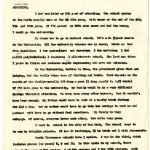
deepe
prisoner–
34
SHCOOLING.
I had com
pleteed my 9th year of schooling. The school system in the North usually ends at the
11tx 10th year, with exams at the end of the 4th, 7th and 10th year. If I’d passed my 10th year exams and had the money, I could go to the university.
My dream was to go to medical school. It’s a f- 5-year course in the University. All the university classes are in
Hanoi, which
as has five faculties: 1 for agriculture and forestry; 1 for medicine; 1 for
politipolytechnical; 1 teachers; 1 all-students school. The last one takes 7 years to finish and includes
engerr engineering and arts and sciences.
In the University, tution is free, the government gives food and lodging, but the family takes care of clothing and books. Cost depends on the wealth of the family–usually 200 dong a year (1 dong equals U. S.27 cents) If I’d have gone to the university, my family would be in a very difficult
fanxilyx fincancial situation. We have some money after harvest, but it wouldn’t have been enough. My father would have to work at a nearby brick factory for 1.2 a day. And my mother would have to go into her savings to send me and perhaps we’d have to go without food sometimes. My family is very unhappy. Of course, everyone loves each other, but we’re very poor.
I went to school in the city of Nam Dinh, The school used to be run by Catholic priests. It has 20 buildings, 15 in brick and 5 with strawroofs.
North Vietnamese schools have 3 cycles. I was in the third, which includes grades (or years) 8, 9 and 10. In this cycle in my school, there were 4 cla sses of 8th graders, 4 of 9th graders and 2 for 10th graders, each with about 50 people. Girls and boys study together with about 20 girls for every 30 boys in each class.

deepe
prisoner–
45
My home was 10 kilometer (ed note: 1 kilometer equals
x .6 mile) from
Nam Dinh and I rode a motorised cycle to school every day and went home at night. Some students had bicycles and a few had
morto motorised bicycles. In a class of 50, 15 students would have bicycles and two ro three would have motorised ones. Bicycles cost 400 dong; they’re made in
Czeckoslovakia.
fiaxxx Gas cots
-s costs 1.2 dong per le liter.
noteboox A notebook of 20 sheets costs .6 dong and cigarettes cost 1 dong for one brand and 1/2 dong for another brand.
Thirthy teachers taught in the school. I studied math, chemistry, physical sciences for about 12 hours a week. Also geography for 2 hours; history for 2 hours; literature for 2 hours. We had no military training in school.
In
1961-62 my school taught Russian
luan language for four hours a week. But in
1961-62 my school taught in only one hour a week. There are no Chinese language classes. I didn’t study any foreign languages, but if a studenx wants to specialize in any language he can go to a
special foreign language school in
Hanoi.
Also about four hours a week we had political studies and learned about Max
t Marxism. The teachers were administrative cadre from the Vietnamese governmental services and are members of the Communist party.
These classes are very boring. It takes too many hours of study to the detriment of other lcasses–it takes time away from math for example. Political studies are for the third cycle only; in the second cycle–grades 5-
⟨6⟩-7 the students are too small.
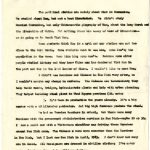
deepe
prisoner–
56
The political studies are mainly about what is Communism. We studied about
Mao, but not about
Khrushchev. We didn’t study Russian Communism, but only Chinese–the glography of
Mao, about the Long March and the liberation of China. But nothing about his teory of wars of liberation–as is going on in South Viet Nam.
Some students think
Mao is a myth and our studies are not too close to the
turt truth. Some students want to see him, some don’t; the population is the same. Some like him; some don’t. Because some older people studied history and they know China
xxx has dominated Viet Nam in thepast and
Mao is the
lrad leader of China. I wouldn’t like to meet
Mao.
I didn’t see Russians and Chinese in
Nam Dinh very often, so I couldn’t notice any change in numbers. The Chinese are technicians; they help build roads, bridges, hydraulic plants and help with urban planning. They helped building steel plant in
Thai Nguyen province (Ed. note:
[?]). It’s been in production two years already. It’s a big center with a 40 kilometer perimeter. And big high furnaces produce the steel.
We had no Russian teachers in school, but there were many Russians with the government administrative services in
Nam Dinh–maybe 20 or 30. I saw a small car with a Vietnamese chauffer
xxx driving three Russians around
Nam Dinh once. The Chinese x were more numerous than the Russians in
Nam Dinh, but I last saw
Nam Dinh in
April, 1963. I don’t know how many are in
Hanoi. All foreigners are dressed in civilian clothes; I’ve never seen a foreigner dressed in military clothes.
The North Vietnamese
poeple peopledauxx have no opinion about the government–we don’t see the government often, except Independence Day,
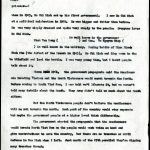
deepe
prisoner–
67
when in
1945,
Ho Chi Minh set up his first government). I saw
Ho Chi Minh at a political celebration in
1962. He was bigger and fatter than before. He was very simply dressed and spoke very simply to the people. Everyone loves
Ho Chi Minh.
Phan Van Dong (
President)
is well known in the government and Gen. Vo Nguyen Giap (
⟨[?]⟩) is well known in the military. During battle of Diem Bien
k Binh Phu (the defeat of the French in
1945),
Ho chi Minh and
Giap came to the ba ttlefield and lead the battle. I was very young then, but I heard people talk about it.
Since
19621961, the government propaganda said the Americans are invading Vietnam and the South Vietnamese would march towards the North. Before coming to South Viet Nam, I was told we’d liberate it, but we weren’t told many details about the South. They Army didn’t tell us much about the South either.
But the North Vietnamese perople don’t believe the southerners will march towards the north. Each part of the country would stay separate but maybe the government people at a higher level think differentl.
The government started the propaganda that the Southerners would invade North Viet Nam so the people would work twice as hard and give contributions to save the country, but there are no trenches or civil defense in
Nam Dinh when I left. Just north of the
17th parallel they’re digging many trenches though.
(More)
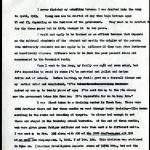
deepe
prisoner–
78
I never finished my
schollingschooling because I was drafted into the Army in
April, 1963. Young men can be drafted at any time
bege between ages 18 and 27, depending on the decision of the government. They used to be drafted fo for the three years but in
1960, changed it to two years.
I could not apply to be trained as an officer because that depends on the cultural standards of the student and mostly the origins of the person. Even university students can not apply to be officers if they come from landowner or reactionary classes. Offiers have to be from the poor peasant class and recommended by the Communist Party.
When I went to the Army, my family was sa
id and even cried, but it’s impossible to avoide it since I”d be arrested and jailed and
drvien driven out of school. Before leaving, my family gave me a farewell dinner and mymother cried and complained, ‘I’ve
triedxtoxraisexmyxsonxupx mxxxxx raised my son up to twenty years of age; I’ve sent him up to the 9th class; now the government takes him from me. It’s impossible for me to keep him.”
I was first taken to a training center in
Thanh Hoa. There were 2000 draftees there and for three months we went through basic training–like
marcx marching in the ranks and shooting at targets. We always had enough to eat there and stayed in the training school barracks. AT the end of three months, we
r were given green fatigue uniforms and were then sent x to different units. I was sent to Div. 324 along with 200
of the 2000 draftees.xxx all 200 [?]of us came—one company–co. 6, batl. 7 of Div. 324. This division was stationed in
Nghe An.
[?](American intelligence experts aware of 325th Div., but not the 324th).
(More)

deepe
prisoner–
7 89
⟨——–⟩This division was stationed in
Nghe An. We worked with the Division eight hours a day and two nights a week we had night training and went outon manouvers at the end of the year. I specialized in .82 mm mortars.
But when it rained, we took political studies–on the military tradition of the army; sometimes we’d have the studies eight or nine days in a row when it rained, and thensometimes we wouldn’t have them for two or 3 months. We could send letters to our family whenever we wanted; a stamp cost
12 dong .12 dong.
The officers
⟨[check mark]⟩ of the division became the officers of my company. Each company had on company commander, one deputy, one political cadre, but no staff officers because they’re only with battalions. Most of the officers in my company and battalion were
indrxxkxxinxam about 30; officers at division-level were about 35-40, but we didn’t see these very often. Most of the time all officers wore rubber tire sandals like mine, but occasionally they wore boots.
I know about 10 or 15 of the other privates pretty well; all were
froxxixx North Vietnamese. All 200 in our group sp
ioke in North Vietnamese dialect.
After six months of this training with the division, I went with one battalion for 20 days in
Paril April, 1964 to work on roads and build dikes on the River Lam. We were then sent back to the division. I’d been in the army a year by then (
April, 1964) but I was not allowed to see my parents. We’re supposed to have seven days leave a year.
(m9re)

deepe
prisoner
910
Then in May, I went with two companies–180 men–by
nine truck to the south–to
Dong Hoi (
⟨[?]⟩ ). Each truck
hadx carried 20 men. The trucks were new, Chinese-made
Molotovas, some with four wheel, some with six.
We stayed overnight at
Dong Hoi.
At 6 a.m. the next day, we were taken to the airport in
Dong Hoi to board a helicopter for
Laos. I’d never seen a helicopter before, but I felt normal. Others in the company were suprised at it, and just stared at it. No one protested when we were given orders to go to South.
There were only 2 helicopters at the airport, but 20-30 airplanes with two propellers. There were no foreigners at the
⟨[?]⟩ airpot and the pilots for the helicopters were Vietnamese. The two helicopters could carry
i 20 men each; they were russian-made; they had russion characters on them, and were painted blck. Each trip to
Laos took 40 minutes and each made 5 trips.
Of the 180 men I went to
Laos with, about 100
bxlangxrm had been in basic training with me. About 20 came from other provinces. But
h all
ihsrprixxxx 180 spok
en North Vietnamese. I never heard anyone speaking another dialect.
We landed somewhere in the jungles of
Laos and got out the helicopter and had to march all day for ten days. One adre from the South meet us in
Laos and took the whole group to the Western border of
Thua Thien province (South Viet Nam). He didn’t have a uniform and we called him chief of the group. There were other local cadre too, without uniforms,
ma and we called them simply chief. (More)

deepe
prisoner–
1011
When we a rrived at the western border of
Thua Thien, we stayed there 2 months, clearing the jungle
⟨And planting⟩ fo5 for a small helicopter pndx landing some. We alsoplanted manice (
⟨[?]⟩ ). During these two months we ate more manice than rice and we had six Southern officers for the two companies. These officers had a different accent and were more difficult for us to understand.
In this jungle area, we had no classes; no camps or barracks. We only x worked in the jungle and slept in hammocks. When I got on the helicopter
Whxxx I carried with me my rifle, hammock, bag of clothes, 80 bullets. I was in uniform on the helicopter and also in the jungle; I had three uniforms of good fatiguex
⟨—–⟩thick cloth and one wool coat. Nobody was allowed to have
ai da diaries or to write letters to their families. I couldn’t even write to my mother I was going South and
k now she doesn’t know where I am.
In the jungle we saw planes and helicopters and the southern cadre said they were american. We were all homesick and we talked about our places at home. I had headaches and caught malaria–all th enurses were men and they didn’t have enough medicine–only cotton,
anot anti-malaria drugs and some penicillin for injections,
Then one day were were told to march. We were given no ex
planations except it was secret and could not be revealed. A
sot Southern
maxirax officer gave me black shorts and shirt to wear. I left to uniforms in the jungle and put another uniform and khaki hat in bag along with a piece of nylong on meter by two metr x to serve as a raincoat. I also had my rifle, which fired five shots, one shot at a time, and
4080 bullets.

deepe
prisoner–1
12
We left the jungle and marched four nights to the lowlands; in the daytime we went into the bushes. WE followed one trail, man behind man, in single file. We were organized in platoons of 22persons each and we traveled through the trial one platoon at a time. Each platoon had Southern leaders and one deputy–so nine platoon leaders and nien nine deputies–all Southerners.
After four days we came to one village and made an attack about 7 p.m. But I and 3 others got lost befre the attack about one
ilo kilometer from the village.
I saw many people but I dare not attack them for food because would reveal I was a Northerner and I had no money.
On the second day
⟨[?]⟩all four of us were daugh caught; two were killed, one escaped but
⟨I⟩ was wounded and later captured. I was caught by regular forces of more than 40 men when I got wounded in the knee.
xSoumxdxmdx South Viet Nam is different from the North. Here the villages have trenches and spkes spikes around them (strategic hamlets), but in the North, they have no defenses. In the South x you can have anything you want if you have the money–you could by radios and bicycles. But n in the North, even if one had the money, he could not buy a radio. ONly the cadre can– and
radios cost 700 dong.
I don’t know what will happen to me
kx now. I hope the government will be lenient to me and let me go free. I’d stay in the South and work. But I wound wouldn’t join
g the South Vietnamese army. I’ve had enough of Army life.
-30-
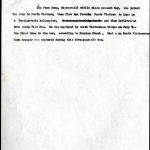
L
ee Phan Hung, 24-year-old middle class peasant boy, who joined the army in North Vietnam, then flew
to from
xLx North Vietnam to Laos in a Russian-made helicopter,
Hexmanxximxxbyxflmxx and then infiltrated into South Viet Nam. He was captured by South Vietnamese troops on
July 7–the first time in the war, according to Premier Kanh, that a nx North Vietnamese-born trooper was captured during this five-year-old war.
#Other things to include: brief historical summary of NVN and SVN? Photos? Uncertainty in Media?
 Bev Deepe
101 Cong Ly Saigon
prisoner one
Bev Deepe
101 Cong Ly Saigon
prisoner one
 deepe
prisoner–2
I was born in Nam Dinh province. My father is
deepe
prisoner–2
I was born in Nam Dinh province. My father is  deepe
prsioner
deepe
prsioner  deepe
prisoner–
deepe
prisoner– deepe
prisoner–
deepe
prisoner– deepe
prisoner–
deepe
prisoner– deepe
prisoner–
deepe
prisoner– deepe
prisoner–
deepe
prisoner– deepe
prisoner–
deepe
prisoner– deepe
prisoner
deepe
prisoner  deepe
prisoner–
deepe
prisoner– deepe
prisoner–1
deepe
prisoner–1 Lee Phan Hung, 24-year-old middle class peasant boy, who joined the army in North Vietnam, then flew
Lee Phan Hung, 24-year-old middle class peasant boy, who joined the army in North Vietnam, then flew 